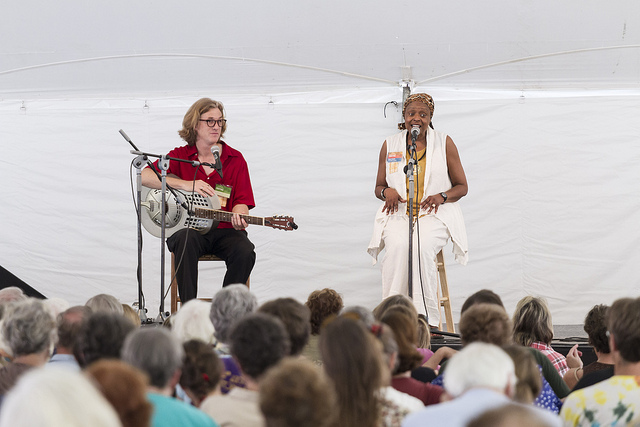Blockchain Narratives: A Future of Storytelling

Image by Diane Ferlatte The International Storytellers' Festival
Recently, I discovered a juicy white paper about storytelling and blockchain. Check out this meaty morsel from the Story Blocks: Reimagining Narrative Through the Blockchain Case Study:
At first glance, the idea of combining stories and cryptocurrencies might seem outlandish, however, the structural breaking down of stories into constituent parts and formulae is well established – from Aristotle’s analysis of tragedy in Poetics, to Georges Polti identifying thirty-six plots (1954), to Campbell’s monomyth (1993), and Booker’s seven themes (2004). Propp’s (1968) codification of Russian folktales into thirty-one discrete functions, describes the structural elements of a tale as assigned to its characters, and his analysis continues to have a profound influence on the computational production and theories of interactive narrative (e.g. Nakasone and Ishizuka, 2006; Cavazza et al., 2009; Gervás, 2013).
Quote from StoryBlocks
In other words, we've been breaking up stories into pieces and blocks for a while now. As scholar/artist Nick Sousanis unpacks in his opus Unflattening, we are expanding our perceptions rather than making sense of the world in a partial, or flattened, way. Here he is in his own words with The Paris Review:
"Unflattening—both the book and the concept—is talking about multimodality, about interdisciplinarity, about image-text, it’s both public and scholarly. It’s saying that we need to dimensionalize the kinds of conversations we have rather than coming at them head-on."
Can blockchain dimensionalize authorship and narratives? How would a blockchain narrative unfold? And how would that be different than a cryptocurrency story, or are they one and the same?
I actually think that a block chain narrative and a cryptocurrency narrative are quite different.
A great example of a cryptocurrency story would be Back To Earth. A transmedia narrative that uses smartcoins to access new/premium content and or subsequent chapters. The story is crafted by a trio of production companies who control the narrative. There is no distribution of the story being told. However, there is a distribution of content along multiple channels that utilize cryptocurrencies to add on to the core features and main narrative. Don't get my wrong, I'm no poo-pooing this type of work, I think it's quite exciting actually. But it's not blockchain driving the story.
A blockchain narrative, I believe, is a more complicated and transgressive concept. We are at the dawn of a new age of storytelling. Narratives no longer need to be fixed, but can be in flux based on location and time. The lines between author/reader/text are blurring. Is the author now a single voice or a crowd sourced hypertext? The Future of Storytelling founder, Charles Melcher, frames this new paradigm quite seductively:
What would a blockchain story look like? Would each block contain a subtly altered or augmented version of a story? Would there ever be a canonized story or more of a directory of elements shuffled across the chain? Or is the "real story" just the version that's been in the chain the longest?
.gif)
I'll leave you with this other bangin' quote from StoryBlocks:
In oral storytelling, it is said that the only time a story can truly belong to or be owned by an individual is in the act of telling. Yet even that statement is potentially contentious, for it is actually shaped and therefore belongs to the grouping of listeners and teller as a whole, bound to that instant in time.
Now that instant can be captured. The phenomenon of the act of storytelling can be added to an infinitely expanding ledger. A truly neverending story ...

sorry, I couldn't resist~
Sources:
Maxwell, Deborah orcid.org/0000-0002-1896-6925, Speed, Chris and Pschetz, Larissa
(2017) Story Blocks : Reimagining narrative through the blockchain. Convergence: The
International Journal of Research into New Media Technologies. pp. 79-97. ISSN
1354-8565
100% of the SBD rewards from this #explore1918 post will support the Philadelphia History Initiative @phillyhistory. This crypto-experiment conducted by graduate courses at Temple University's Center for Public History and MLA Program, is exploring history and empowering education. Click here to learn more.
You've definitely hit on something about this whole learning curve that resembles a breakthrough. Being able to understand the blockchain is one thing. Being able to wield it as a metaphor is quite another.
Does anyone else feel this whiff of the epic?